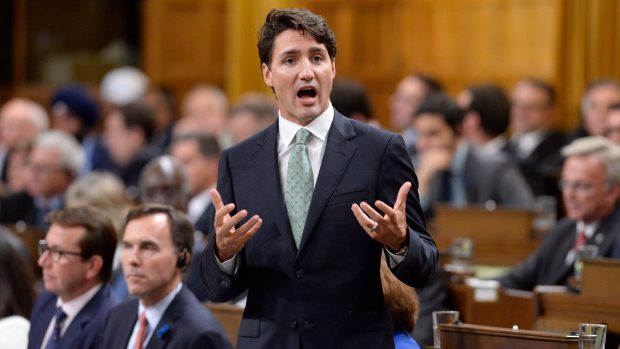The Conservatives have now had several votes regarding Ukraine, both around the trade agreement implementation legislation and the appropriations around extending funding for Operation Unifier, which sees Canadian troops training Ukrainians, and in each case, the Conservatives have voted against Ukraine’s interests. Days later, they began protesting that they were the real supporters of Ukraine and not the Liberals, but their proof of doing so dated to the Harper-era, and their accusations that the Liberals don’t are either non sequiturs or false conflations. It raises all kinds of questions as to just whom Poilievre is trying to send signals by these moves, and what the endgame is.
After the Operation Unifier votes, I’m not sure that we can satisfy ourselves with the explanation that Poilievre is trying to cast himself as a fighter against carbon pricing, and that he’s willing to go to cartoonish lengths to do so. That excuse never made any sense considering that Ukraine has had a price on carbon since 2011, that they will maintain it as part of their entry process into the European Union, and that the mention in the enhanced trade agreement has to do with possible border adjustments (because we will soon be entering into an era of carbon border adjustments as more countries and trading blocs adopt carbon pricing). While he has insisted that he didn’t vote against the operation, he was voting non-confidence in the government, that excuse is hard to swallow when you consider that they insisted on line-by-line votes for the Estimates, and that voting yes on this one line-item would have sent a stronger signal of multi-partisan support for the mission than the performative foot-stamping that were these 130 consecutive non-confidence votes tied to the spending allocations.
The games haven’t stopped there either. After the circus act at committee where they moved out-of-order amendments related to removing the carbon price or trying to add in wholly unnecessary language about arms sales (remember, this treaty has already been negotiated, signed and ratified—this bill is only about amending whatever domestic legislation needs to be adjusted to comply with the agreement), they proposed to force a vote in the House of Commons before heading home for the holidays, presumably to try and get it off the radar rather than let it hang over them over the holidays, and extend the beating they’re taking for a portion of their base. Government House Leader Karina Gould wasn’t going to give them that reprieve, and instead told the Commons on Thursday that she would delay scheduling the vote until the New Year so that the Conservatives can hear from their constituents and reflect on the vote, and then come back and vote in favour of the bill so that it can be unanimous and send that signal of support to Ukraine.
But sending signals are very much at the heart of what these votes are about, and the question becomes who the intended audience is for which message—because clearly, Poilievre is trying to have it both ways, believing himself to be clever enough to get away with both boasting that he and his party are supporters of Ukraine, while also being very visible in being seen to vote against this bill and the Unifier funding. The government has seized on the notion that this is the influence of MAGA Republicans, and one cannot deny that this is a base that Poilievre has been working hard to suck up to since before his leadership race began, when he was busy posing with so-called “Freedom Convoy” occupiers outside of Parliament Hill, and doing his best to sanitize their image over social media.
This is a voting bloc that he has calculated that can get him over the top in the next election without having to appeal to the political centre, because Conservatives have taken the wrong lessons from the previous two elections and the previous two leaders, who pretended to run on centre-right platforms even though everybody could see how transparently false this really was. And given how credulous this voter base really is, who huff every conspiracy theory they can find on the internet, particularly those about how Russia was trying to destroy “biolabs” in Ukraine, or how president Volodymyr Zelenskyy is a money-launderer or is secretly buying yachts and Florida resorts, Poilievre knows they will buy his lies about this being about the carbon price in the treaty or their trying to add in language about arms sales. At the same time, Poilievre also has a record of being oblivious to the fact that he has been a useful idiot for far-right extremists in this country.
This is why the chair of the Ukrainian Canadian Congress is so concerned about the Conservatives’ recent votes, and has been imploring that they change their minds. She is concerned that these votes are the “thin edge of the wedge,” akin to what we are seeing happening in Washington, where America First and isolationism are taking hold in the Republicans, and Poilievre is exhibiting some of these signs, dismissing the Liberals calling him out over the Ukraine votes as “fear and falsehoods over far away foreign lands.” This language was pounced upon by the Liberals, pointing to its use by both Donald Trump and Neville Chamberlain, but again, this was a signal to a particular base. So is the fact that Poilievre won’t talk about Ukraine over Twitter, but will let Michael Chong and James Bezan do it on his behalf. That doesn’t happen by accident.
But what if the signal isn’t just to the Convoy/MAGA crowd? This is the part that increasingly concerns me—that Poilievre and the Conservatives are increasingly playing to the acolytes of Hungarian prime minister Viktor Orbán, as he positions himself for what he sees as a coming “post-liberal” world, where “illiberal democracy” works to undermine institutions and opposition—because we have seen Poilievre engaging in those same impulses. Orbánism is also spreading to the MAGA crowd in the US, and it’s trying to find a purchase in Canada, including in Poilievre’s party as the Danube Institute, which is funded by Orbán’s government, treated several of his MPs to a lavish trip to London. If Poilievre sees being coy about Ukraine as a signal to this crowd, we may be in a lot more trouble than we realize.







